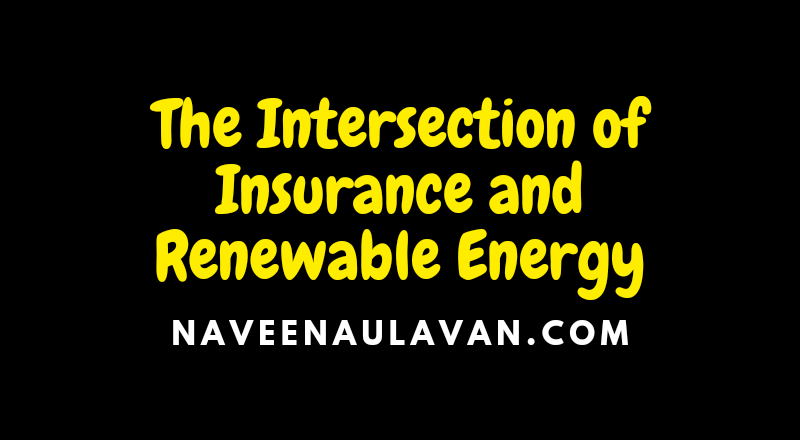Renewable energy sources such as solar and wind are increasingly becoming mainstream options to meet the world’s energy demands. As the transition to renewable energy accelerates it brings forth new opportunities and challenges. One such challenge is managing risks associated with renewable energy infrastructure and this is where the insurance industry plays a crucial role. Insurance providers have started to recognize the potential of the renewable energy sector and are developing specialized products to meet its unique needs. This article explores the intersection of insurance and renewable energy and its significance in promoting sustainable energy solutions.
The Risks Faced by Renewable Energy Projects
Developing and operating renewable energy projects involves various risks that need to be managed effectively to ensure the long-term viability of these projects. Some of the key risks associated with renewable energy projects include:
1. Construction and Installation Risks
Building renewable energy infrastructure such as wind farms or solar power plants involves complex engineering and construction processes. Construction delays cost overruns and quality control issues can significantly impact project timelines and budgets. To mitigate these risks project developers often purchase insurance coverage specifically designed to protect against construction-related risks.
2. Equipment Failure and Performance Risks
The performance of renewable energy equipment such as solar panels or wind turbines can deteriorate over time due to various reasons including weather conditions and normal wear and tear. Equipment failure can result in significant financial losses for project owners affecting their ability to generate revenue. Insurance coverage can help safeguard against such risks by providing compensation for equipment repair or replacement.
3. Business Interruption and Revenue Risks
Renewable energy projects may face disruptions due to unforeseen circumstances such as natural disasters or grid failures. These events can lead to a loss of revenue if the project is unable to produce electricity. Business interruption insurance can provide coverage for lost revenue during such periods.
4. Environmental and Liability Risks
Renewable energy projects interact with the environment and any negative impact on natural resources or wildlife can result in legal liabilities. Additionally there may be risks associated with pollution incidents or accidents. Environmental liability insurance can help protect project developers and operators from such risks ensuring they can comply with regulatory requirements and mitigate potential financial liabilities.
Specialized Insurance Products for the Renewable Energy Sector
Recognizing the unique risks faced by renewable energy projects insurance providers have developed specialized products tailored to the needs of the sector. These products include:
1. Construction All Risk (CAR) Insurance
CAR insurance provides coverage for physical loss or damage during the construction phase of renewable energy projects. It covers risks associated with construction delays third-party liability and damage to equipment.
2. Delay in Start-Up (DSU) Insurance
DSU insurance offers protection against financial losses resulting from project delays. It covers additional expenses incurred loss of revenue and interest on borrowed funds due to project schedule disruptions.
3. Operation All Risk (OAR) Insurance
OAR insurance provides coverage for risks faced during the operational phase of renewable energy projects. It covers property damage liability claims business interruption and equipment breakdown.
4. Renewable Energy Insurance Package
Some insurers offer comprehensive insurance packages that combine various coverage types specific to renewable energy projects. These packages typically include coverage for construction performance guarantee equipment breakdown business interruption and liability.
The Role of Insurance in Promoting Renewable Energy
The insurance industry plays a pivotal role in promoting the growth of renewable energy by providing a safety net for project developers and investors. The availability of specialized insurance products specific to renewable energy projects helps address the sector’s unique risks thereby boosting investor confidence and facilitating project financing. Here are some ways insurance supports the renewable energy sector:
1. Risk Transfer and Mitigation
Insurance allows project developers to transfer or mitigate risks associated with renewable energy projects reducing their exposure to potential financial losses. This risk transfer mechanism provides greater certainty and confidence to investors and lenders enabling the availability of capital for renewable energy projects.
2. Enhanced Bankability
Renewable energy projects often require substantial upfront investments. Lenders often require project developers to have insurance coverage in place making the project more bankable. Insurance coverage provides lenders with additional assurance that their investments are protected enhancing the project’s creditworthiness.
3. Regulatory Compliance
Insurance coverage can help project developers demonstrate compliance with regulatory requirements. Many jurisdictions require renewable energy projects to have specific insurance coverage to ensure protection against potential risks and liabilities arising from environmental impacts or equipment failures.
4. Loss Recovery and Business Continuity
In the event of a loss or damage insurance coverage can help project developers recover their financial losses quickly ensuring business continuity. The availability of insurance coverage helps minimize disruptions and enables project owners to address any unforeseen events efficiently.
5. Encouraging Technological Advancements
Insurance providers can incentivize investment in technology and innovation by offering coverage for emerging risks or new technologies in the renewable energy sector. By embracing new technologies and providing insurance solutions insurers can foster the development and deployment of cutting-edge renewable energy technologies.
Conclusion
The intersection of insurance and renewable energy plays a crucial role in managing risks and supporting the growth of renewable energy projects. The availability of specialized insurance products provides investors and lenders with the confidence needed to finance these projects. With the continued development and expansion of renewable energy infrastructure the insurance industry will play an even more significant role in providing risk management solutions and supporting the transition to a sustainable energy future.
